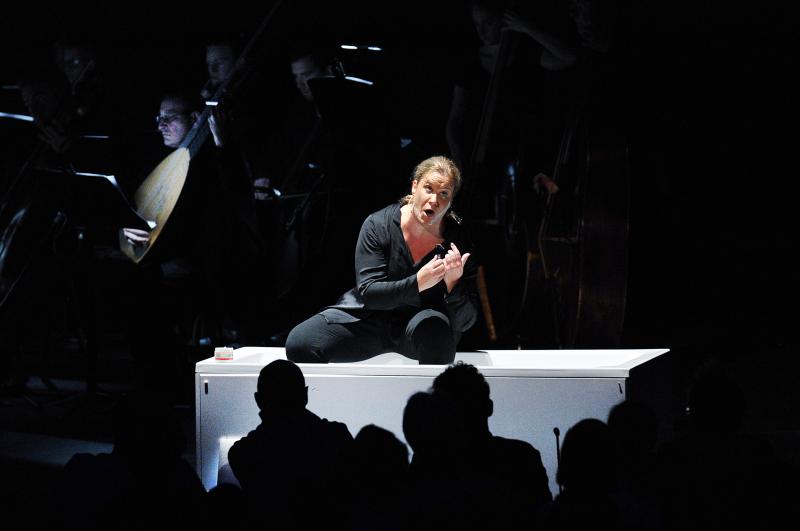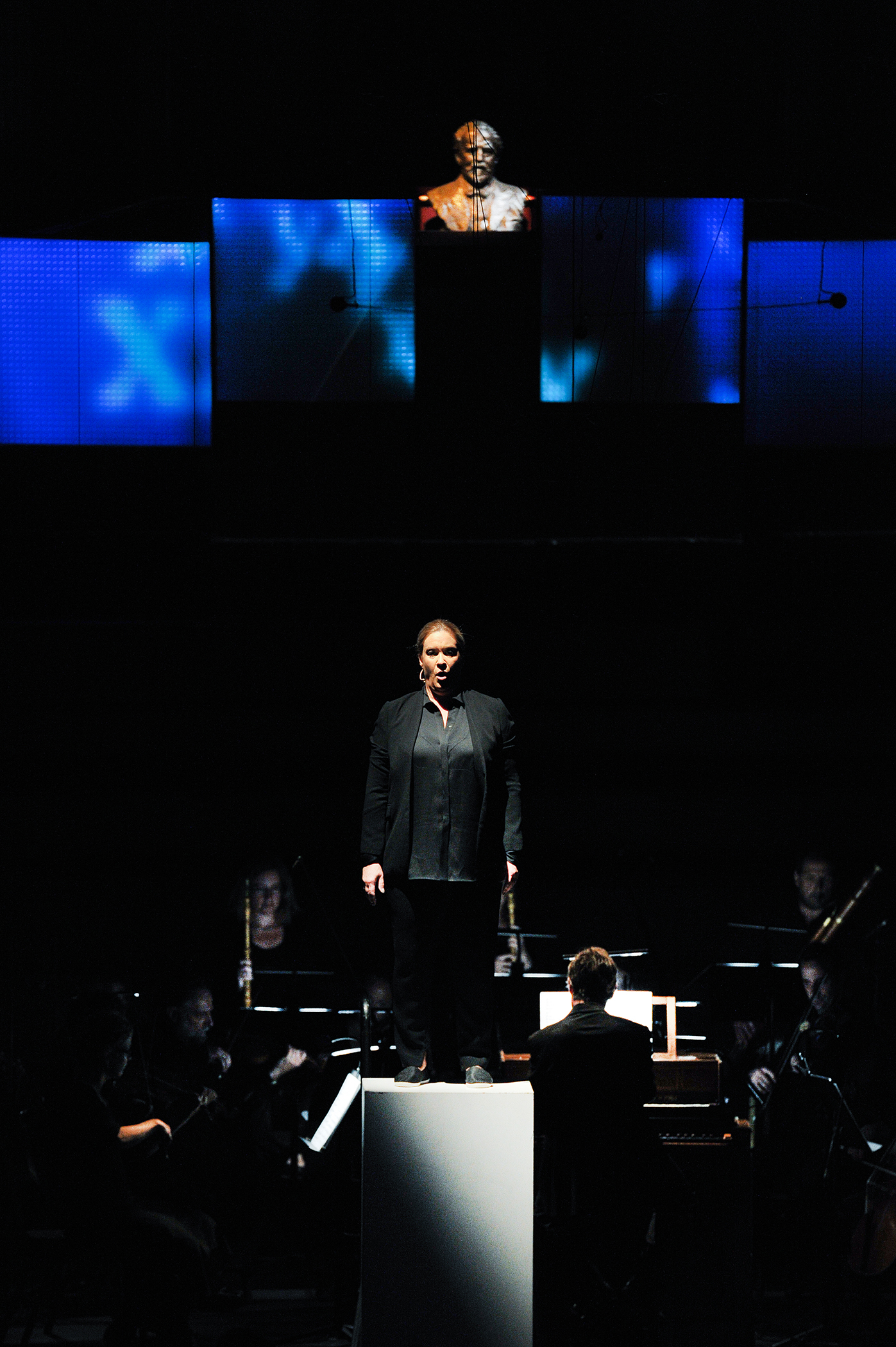Prom 65: Coote, English Concert, Bicket | reviews, news & interviews
Prom 65: Coote, English Concert, Bicket
Prom 65: Coote, English Concert, Bicket
Gender trouble at the Proms for Alice Coote and Handel

What was a stunningly good Alice Coote recital doing trapped inside an A-level Theatre Studies project? I’m not sure that Being Both – the semi-staged sequence of Handel arias originally commissioned by the Brighton Festival – ever came close to answering, but by about ten minutes in the singing was just so damn good that I stopped worrying and learned, if not precisely to love, then to tolerate the foolishness going on around the music.
In case the title wasn’t clue enough, Being Both is the kind of earnest, self-referential exploration of gendered experience (so delicately inverted and subverted in Handel’s girls-who-play-boys-who-kiss-girls trouser roles) you’d usually find staged in a fringe theatre with a sticky floor and an audience full of people carrying copies of Judith Butler and Julia Kristeva.
Apparently it took both a stage director (Susannah Waters) and a movement director (Christopher Tudor) to come up with the cavorting, gurning, flapping, crotch-grabbing and possibly masturbating (we were too far away to be certain) that made up the physical accompaniment to some of Handel’s best operatic arias, adding a bizarre visual pantomime to scenes from Giulio Cesare, Ariodante, Messiah and Alcina among others.
This was a five-star concert in a one-star stagingPlaying not only the man but also the woman (Cleopatra, Dejanira, Semele), Coote was, unusually, able to explore that duality, something she did with beautiful subtlety in her vocal characterisation. While it was hard to warm to the extreme colours of the self-parodying Dejanira, Coote’s Semele was all poised sensuality and grace, her light-footed lovemaking set against the mature tragedy of Cleopatra’s exquisite "Se Pietà" – the one moment in the opera where this flighty seductress borrows all the sober gravitas of Cornelia.
Sitting somewhere between the genders, a moment of sexless pathos, was "He was despised" from Messiah. Despite the bath tub setting (why?), Coote’s simplicity of delivery and the range of colour she found in this static and low-lying aria were extraordinary, letting the voice and the delicate psychology of Handel’s melody do the work.
 Over on the XY side of the evening we had Ruggiero’s cantering "Sta nell’Ircana" from Alcina (with the added bonus of some gloriously dirty horn-playing from the English Concert) and the two magnificent alto arias from Ariodante – "Dopo Notte" and "Scherza Infida". The latter was beautifully paced by Coote and conductor Harry Bicket, giving plenty of space to the plangent solo bassoon (surely there’s no better solo for the instrument in baroque opera?), while the former was a slow-burn fury. Starting slow and deliberately underplaying things, Coote drove the aria to a frenzied coloratura climax, working a disappointingly spare crowd up to serious excitement.
Over on the XY side of the evening we had Ruggiero’s cantering "Sta nell’Ircana" from Alcina (with the added bonus of some gloriously dirty horn-playing from the English Concert) and the two magnificent alto arias from Ariodante – "Dopo Notte" and "Scherza Infida". The latter was beautifully paced by Coote and conductor Harry Bicket, giving plenty of space to the plangent solo bassoon (surely there’s no better solo for the instrument in baroque opera?), while the former was a slow-burn fury. Starting slow and deliberately underplaying things, Coote drove the aria to a frenzied coloratura climax, working a disappointingly spare crowd up to serious excitement.
The concert could easily have ended there, but Coote has one final dramatic card to play, pulling us back into the intimate cello-and-voice duet that makes up the bulk of the exquisite "There, in myrtle shades" from Hercules. Trading musical confidences with the English Concert's magnificent cellist Joseph Crouch, Coote sang simply and straightforwardly, finding an emotional directness that had been lacking amongst all the affected stage business of the previous hour.
This was a five-star concert in a one-star staging, but somehow Coote’s energy and bravery managed to carry the day.
Read theartsdesk's reviews of other concerts from the BBC Proms 2015
rating
Explore topics
Share this article
The future of Arts Journalism
You can stop theartsdesk.com closing!
We urgently need financing to survive. Our fundraising drive has thus far raised £49,000 but we need to reach £100,000 or we will be forced to close. Please contribute here: https://gofund.me/c3f6033d
And if you can forward this information to anyone who might assist, we’d be grateful.

Subscribe to theartsdesk.com
Thank you for continuing to read our work on theartsdesk.com. For unlimited access to every article in its entirety, including our archive of more than 15,000 pieces, we're asking for £5 per month or £40 per year. We feel it's a very good deal, and hope you do too.
To take a subscription now simply click here.
And if you're looking for that extra gift for a friend or family member, why not treat them to a theartsdesk.com gift subscription?
more Classical music
 Hallé John Adams festival, Bridgewater Hall / RNCM, Manchester review - standing ovations for today's music
From 1980 to 2025 with the West Coast’s pied piper and his eager following
Hallé John Adams festival, Bridgewater Hall / RNCM, Manchester review - standing ovations for today's music
From 1980 to 2025 with the West Coast’s pied piper and his eager following
 Kaploukhii, Greenwich Chamber Orchestra, Cutts, St James's Piccadilly review - promising young pianist
A robust and assertive Beethoven concerto suggests a player to follow
Kaploukhii, Greenwich Chamber Orchestra, Cutts, St James's Piccadilly review - promising young pianist
A robust and assertive Beethoven concerto suggests a player to follow
 Robin Holloway: Music's Odyssey review - lessons in composition
Broad and idiosyncratic survey of classical music is insightful but slightly indigestible
Robin Holloway: Music's Odyssey review - lessons in composition
Broad and idiosyncratic survey of classical music is insightful but slightly indigestible
 Classical CDs: Wolf-pelts, clowns and social realism
British ballet scores, 19th century cello works and contemporary piano etudes
Classical CDs: Wolf-pelts, clowns and social realism
British ballet scores, 19th century cello works and contemporary piano etudes
 Bizet in 150th anniversary year: rich and rare French offerings from Palazzetto Bru Zane
Specialists in French romantic music unveil a treasure trove both live and on disc
Bizet in 150th anniversary year: rich and rare French offerings from Palazzetto Bru Zane
Specialists in French romantic music unveil a treasure trove both live and on disc
 Scottish Chamber Orchestra, Ibragimova, Queen’s Hall, Edinburgh review - rarities, novelties and drumrolls
A pity the SCO didn't pick a better showcase for a shining guest artist
Scottish Chamber Orchestra, Ibragimova, Queen’s Hall, Edinburgh review - rarities, novelties and drumrolls
A pity the SCO didn't pick a better showcase for a shining guest artist
 Kilsby, Parkes, Sinfonia of London, Wilson, Barbican review - string things zing and sing in expert hands
British masterpieces for strings plus other-worldly tenor and horn - and a muscular rarity
Kilsby, Parkes, Sinfonia of London, Wilson, Barbican review - string things zing and sing in expert hands
British masterpieces for strings plus other-worldly tenor and horn - and a muscular rarity
 From Historical to Hip-Hop, Classically Black Music Festival, Kings Place review - a cluster of impressive stars for the future
From quasi-Mozartian elegance to the gritty humour of a kitchen inspection
From Historical to Hip-Hop, Classically Black Music Festival, Kings Place review - a cluster of impressive stars for the future
From quasi-Mozartian elegance to the gritty humour of a kitchen inspection
 Shibe, LSO, Adès, Barbican review - gaudy and glorious new music alongside serene Sibelius
Adès’s passion makes persuasive case for the music he loves, both new and old
Shibe, LSO, Adès, Barbican review - gaudy and glorious new music alongside serene Sibelius
Adès’s passion makes persuasive case for the music he loves, both new and old
 Anja Mittermüller, Richard Fu, Wigmore Hall review - a glorious hall debut
The Austrian mezzo shines - at the age of 22
Anja Mittermüller, Richard Fu, Wigmore Hall review - a glorious hall debut
The Austrian mezzo shines - at the age of 22
 First Person: clarinettist Oliver Pashley on the new horizons of The Hermes Experiment's latest album
Compositions by members of this unusual quartet feature for the first time
First Person: clarinettist Oliver Pashley on the new horizons of The Hermes Experiment's latest album
Compositions by members of this unusual quartet feature for the first time

Add comment